Suggested Questions for President Ahmadinejad
1. Question on former Tehran prosecutor Saeed Mortazavi
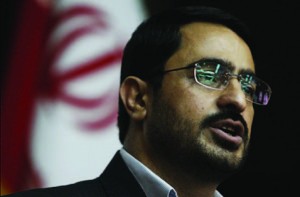 Question: Former Tehran Prosecutor Saeed Mortazavi has been indicted by a special Judges Court within the Iranian Judiciary for his involvement in the arrest orders of protesters that were taken to Kahrizak Detention Center. The detainees were brutally tortured and four of them were killed. Why did you give him a high position in your administration as Head of the Anti-Smuggling Task Force?
Question: Former Tehran Prosecutor Saeed Mortazavi has been indicted by a special Judges Court within the Iranian Judiciary for his involvement in the arrest orders of protesters that were taken to Kahrizak Detention Center. The detainees were brutally tortured and four of them were killed. Why did you give him a high position in your administration as Head of the Anti-Smuggling Task Force?
———————————
Background
Saeed Mortazavi served as Tehran’s Prosecutor at the time of the June 2009 presidential elections. He issued a general arrest warrant four days before the elections, later used by security and intelligence agents to arrest hundreds of well-known journalists, students, and political activists deemed “suspicious.” Nicknamed the “Torturer of Tehran,” Mortazavi ordered the transfer of post-election detainees to Kahrizak Detention Center alongside high risk criminals, in substandard conditions, and subject to torture and abuse, resulting in the deaths of at least four persons, including Mohsen Rouholamini, Amir Javadifar, Mohammad Kamrani, and Ramin Aghazadeh following violent treatment. In total, 147 detainees were sent to Kahrizak. After the official announcement of Mortazavi by the Parliamentary fact-finding committee as “the Kahrizak Suspect,” he was removed from his position as Tehran’s Prosecutor on 30 August 2009, and was appointed as the country’s Deputy General Prosecutor. On Mahmoud Ahmadinejad’s request, he was appointed as Head of the Anti-Smuggling Task Force.
Mortazavi was the main official responsible for the murder of Iranian-Canadian photographer Zahra Kazemi, who died in custody nineteen days after her arrest on 23 June 2003 as a result of “a hard item hitting her head.” Even after a Presidential report at the time implicated him as most responsible, Mortazavi never admitted his involvement and avoided prosecution.
Another journalist and blogger, Omid Reza Mirsayafi, was arrested and imprisoned on the orders of Mortazavi in January 2008, only to die in custody on 18 March 2009, under suspicious circumstances. In 2004, in the “Case of the Bloggers”, Mortazavi’s ordered the arrest, torture, and extraction of false confessions from Omid Memarian, Roozbeh Mirebrahimi, Javad Gholam Tayamomi, and Shahram Rafizadeh were verified
by all four detainees. Mortazavi threatened to kill the prisoners by orchestrating car accidents if they mentioned the torture they endured in prison when released.
In his position as Head of Branch 1410 and Press Court in 2000, through actions later referred to as “wholesale banning of the press,” he ordered closures of hundreds of publications, sending dozens of journalists to prison. Most imprisoned journalists were kept in solitary confinement and tried in closed door courts. Two United Nations Special Rapporteurs, Amibi Ligabo and Loui Juane, who investigated the arbitrary arrests and restrictions on freedom of the media in Iran, provided testimony in a report from 2005. The Rapporteurs called for the dismissal of Mortazavi from all judicial responsibilities.
2. Question on the murderer of former Prime Minister Shapur Bakhtiar
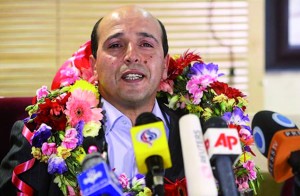 Question: A few months ago, a man who was in prison for 17 years in France for the murder of Iran’s pre-revolution Prime Minister, Shapur Bakhtiar, was sent back to Iran and received a hero’s welcome. How could a man who stabbed and murdered an exiled politician be received as a hero? Was it a gesture of support for those who eliminate the State’s opposition?
Question: A few months ago, a man who was in prison for 17 years in France for the murder of Iran’s pre-revolution Prime Minister, Shapur Bakhtiar, was sent back to Iran and received a hero’s welcome. How could a man who stabbed and murdered an exiled politician be received as a hero? Was it a gesture of support for those who eliminate the State’s opposition?
———————————
Background:
Shapur Bakhtiar was Iran’s last Prime Minister under the Shah. He was murdered on 6 August 1991 in Paris, along with his assistant, Soroush Katibeh, at his residence outside Paris by agents of the Iranian government. One of his murderers, Ali Vakili Rad, was arrested, tried, and sentenced to lifetime imprisonment. The Iranian regime denied any involvement in the assassinations. However, the investigation led by the French investigative judge, Jean-Louis Bruguière, documented the Iranian authorities’ involvement.
France released and returned Vakili Rad to Iran on 18 May 2010.He received a hero’s welcome upon his arrival in Tehran. Iran’s state media posted pictures and footage of Vakili Rad upon his arrival in Tehran, where he was received with flowers from Parliament Member, Kazem Jalili, and Iran’s Deputy Foreign Minister, Hassan Ghashgavi.
3. Question on the jailing of critics of the President
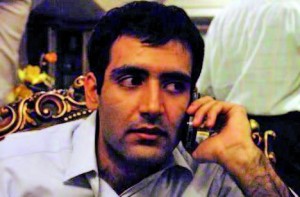
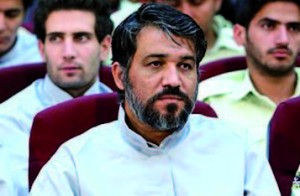 Question: In your previous interviews you have always said that Iran is a free country. At the time I’m speaking to you, there are at least five people inside Iranian prisons on the charge of “insulting the President,” in other words, criticizing you. Why should your critics stay in prison?
Question: In your previous interviews you have always said that Iran is a free country. At the time I’m speaking to you, there are at least five people inside Iranian prisons on the charge of “insulting the President,” in other words, criticizing you. Why should your critics stay in prison?
———————————
Background:
- Student activist Bahareh Hedayat was sentenced to five years in prison for “assembly and collusion against the regime,” to two years in prison for “insulting the Supreme Leader,” and to six months in prison for “insulting the President.”
- Three student activists, Majid Tavakoli, Ehsan Mansouri, and Ahmad Ghassaban were tried in a closed session trial for “publishing and distributing student publications in which sanctities and the President have been insulted.”
- Former Parliament Member Ali Tajernia was sentenced to five years in prison for “assembly and collusion with the intent to disrupt public security,” and to one year in prison for “propagating activities against the regime,” and to 74 lashes for “insulting the country’s authorities (the President and his cabinet).”
- Journalist and member of Tahkim-e Vahdat Alumni Association, Ali Malihi was sentenced to four years in prison for “acting against national security,” and payment of a cash fine for “insulting the president.”
- Imprisoned political activist Heshmatollah Tabarzadi faces four charges: “propaganda against the state,” “gathering and colluding against national security,” “insulting the Supreme Leader and President,” and “insulting Islam.”
4. Question on the three jailed American hikers
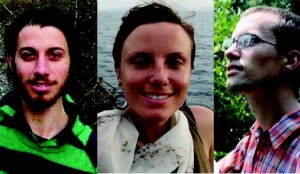 Questions regarding jailed American hikers:
Questions regarding jailed American hikers:
4a. Three Americans, who were arrested on 31 July 2009 in Iran, are still in detention after more than one year. Iranian authorities claim they are spies. Why don’t you take them to court and put them on trial? If you have any evidence that they are not just hikers, why you don’t you hold a free trial and show your evidence to the world?
4b. Why don’t they have access to their lawyer and why can’t they access their families? You might know that Sara Shourd has a dangerous health problem requiring treatment she has been denied. Do you approve of these irregularities? And if not, why haven’t you used your authority as President to send notice to the Iranian Judiciary and to ask them to comply with the law?
4c. A year after their arrest, why doesn’t the Iranian Ministry of Intelligence transfer the case to the Iranian Judiciary? The Iranian Ministry of Intelligence is in charge of the investigation and is under your control. Why haven’t you asked them to accelerate the investigation process and to send the case to court, or the Judiciary?
4d. What if something happens to any of the three Americans, like many Iranians who have lost their lives inside Iranian prisons, including the blogger Omid Reza Mirsayafi, who died in 2006 at Evin prison due to lack of medical attention? Would you take responsibility or would you say it was out of your hands?
———————————
Background:
The Three American hikers:
Nora Shourd, mother of American hiker Sarah Shourd, announced to the media recently that in a surprise telephone call her daughter said her health has deteriorated and that she needs immediate medical attention, which is being denied to her. Families of the American prisoners in Iran are trying to pursue the issue with the United Nations.
Nora Shourd told a local television station that her daughter is still kept in solitary confinement. “This is extremely inhumane,” she said. Sarah Shourd, Josh Fattal, and Shane Bauer have been in prison for more than a year for illegally crossing the border into Iran, something the three hikers say was accidental.
Though their families have hired an attorney for them since last November, the three UC Berkeley graduates have not yet been able to meet with him. During the past year, security organizations have evaded sending the case to the Iranian Judiciary, claiming that the case file is still incomplete. There has been growing concern about the health and conditions of prisoners inside Evin prison during recent weeks. Refuting charges such as espionage in his clients’ case, the three Americans’ lawyer, Massoud Shafie, said, “I have spoken with the case judge and the charge in the case is specifically “illegal border crossing.” We do not have any new laws for illegal border crossing and therefore, the old process will have to be observed in which a cash penalty is stipulated.” Shafie also said that it is very rare that an individual receives imprisonment as punishment for illegal entry. He added, “Only if the issue [of illegal border crossing] is related to another charge, may they receive imprisonment as punishment, and usually, such issues are dealt with through cash penalties. But the main point here is that the charge of espionage is being used inappropriately in this case. Illegal crossing is punished by cash penalties.”
Iranian authorities have so far shown no reaction to questions about Sarah Shourd’s health. The three hikers have only been able to make a few telephone calls over the past year. In addition to feeling depressed due to her solitary confinement, Sarah Shourd has reported a lump in her breast recently.
5. Question on media censorship / shutdown of critical newspapers
 Question: You claim Iran is a free country and at the same time the Ministry of Culture has shut down major newspapers that have been critical of your policies, including Etemad Melli, Etemad, Hayat-e No, and Kargozaran. Is the country free only for your supporters?
Question: You claim Iran is a free country and at the same time the Ministry of Culture has shut down major newspapers that have been critical of your policies, including Etemad Melli, Etemad, Hayat-e No, and Kargozaran. Is the country free only for your supporters?
———————————
Background:
During the administration of Ahmadinejad, the Iranian press has experienced an even worse time with censorship than before. Not only have many newspapers, publications, and websites been banned, but many of their principals have been prosecuted based on charges brought against them by Ahmadinejad’s cabinet members. Mohammad Ali Ramin, Iran’s Deputy Minister of Culture for Press is one of the most extremist thinkers in his cabinet, said to be the influencing force behind Ahmadinejad’s ideas on the Holocaust. In addition, immediately after last year’s post-election protests, hundreds of journalists and bloggers were rounded up, arrested, imprisoned, and tortured for fake confessions, and tried for espionage and actions against national security. Dozens of Iranian journalists are in prison or have had to flee the country to seek refuge outside Iran. Intelligence and security agents and representatives from the Ministry of Culture now routinely dictate the content and topics the press is allowed to cover and report. The list of banned newspapers is long, but a few notable papers include: Etemad Melli, Hayat-e No, Etemad, Kargozaran, Tehran Emruz, Roozegar, Arya, Shargh, Hammihan, Shahrvand-e Emruz, Zanan Magazine, Madreseh, and Irandokht.
6. Question on media censorship / jailed journalists
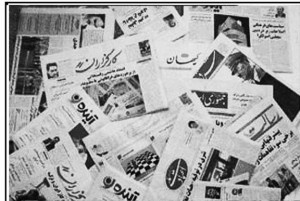 Question: You’ve said that Iran is a free country with free elections. Why does Iran have the highest number of journalists in prison? Have you heard the names of journalists like Bahman Ahmadi Amouee? Kayvan Samimi? Ahmad Zeid-Abadi? Hengameh Shahidi? Issa Saharkhiz? They have been sentenced to long prison sentences and bans on their journalistic activities for what they have written. How can you then claim that Iran is a free country?
Question: You’ve said that Iran is a free country with free elections. Why does Iran have the highest number of journalists in prison? Have you heard the names of journalists like Bahman Ahmadi Amouee? Kayvan Samimi? Ahmad Zeid-Abadi? Hengameh Shahidi? Issa Saharkhiz? They have been sentenced to long prison sentences and bans on their journalistic activities for what they have written. How can you then claim that Iran is a free country?
———————————
Background:
Bahman Ahmadi Amouee and Jila Baniyaghoub, journalists and bloggers, imprisoned June 19, 2009
Amouee, a contributor to reformist newspapers and the author of a blog, was arrested with his journalist wife, Zhila Bani-Yaghoub. Bani-Yaghoub, editor-in-chief of the Iranian Women’s Club, a news website focusing on women’s rights, has been sentenced to one year in prison and a 30-year ban from journalism work. Amouee is serving a five year prison term.
Kayvan Samimi, journalist, imprisoned June 14, 2009
Samimi, manager of the now-defunct monthly Nameh, is serving a six year prison term at Tehran’s Evin prison.
Ahmad Zeid-Abadi, freelance journalist, imprisoned June 2009
Zeid-Abadi, who wrote a weekly column for Rooz Online, a Farsi and English language reformist news website, was arrested in Tehran in June 2009. Zeid-Abadi was also the director of the Organization of University Alumni of the Islamic Republic of Iran and a supporter of defeated presidential candidate Mehdi Karroubi. Zeid-Abadi spent most of the first year of his detention in solitary confinement under inhumane conditions. He was transferred to the notorious Rajaee Shahr Prison in February 2010 where he is serving his six year prison term next to smugglers and hardened criminals. In addition to a prison term, Zeid-Abadi has been sentenced to five years’ exile to the town of Gonabad, and a lifetime ban on political, social, and journalistic activities, interviews or analysis, whether in verbal or written form.
Issa Saharkhiz, freelance journalist, imprisoned July 3, 2009
Saharkhiz, a columnist for the reformist news websites Rooz Online and Norooz, and a founding member of the Association of Iranian Journalists, was arrested in July 2009 while traveling in northern Iran. Saharkhiz has had a long career in journalism. He worked for 15 years for IRNA, Iran’s official news agency, and ran its New York office for part of that time. He returned to Iran in 1997 to work in Mohammad Khatami’s Ministry of Islamic Guidance, in charge of domestic publications. Saharkhiz and a superior, Ahmad Bouraghani, came to be known as the architects of a period of relative freedom for the press in Iran. After Saharkhiz was forced to leave the ministry and was banned from government service in a trial. He founded a reformist newspaper, Akhbar-e Eghtesad, and monthly magazine, Aftab, both of which were eventually banned.
Saharkhiz wrote articles directly critical of Ayatollah Ali Khamenei, Iran’s supreme leader. Saharkhiz has publicly complained about his inhumane conditions inside prison where he has not received medical treatment for broken ribs he sustained during his arrest, leading to physical disabilities. Saharkhiz was sentenced to 15 months in prison and a lifetime ban on journalistic activities on 30 July 2010. He is currently at Rajaee
Shahr Prison where hardened criminals are kept. Saharkhiz went on a two-week hunger strike recently to protest his inhumane prison conditions.
Hengameh Shahidi, blogger and journalist, imprisoned June 2009
Hengameh Shahidi , an adviser to defeated presidential candidate Mehdi Karroubi, a blogger and contributor to reformist newspapers such as Etemad e Melli, was arrested on 30 June 2009. The Committee of Human Rights Reporters, a local watchdog group, reported that Shahidi spent 50 days in solitary confinement and underwent “extreme mental anguish during her interrogation.”
After a brief release on bail, Shahidi was sentenced to six years and three months in prison, a sentence an appeals court quickly upheld in May 2010. She is currently at Evin prison in Tehran.
7. Question on persecution and prosecution of human rights defenders
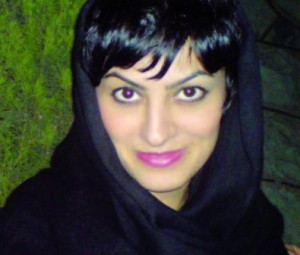 Question: Why are human rights defenders such as Shiva Nazarahari and Nasrin Sotoudeh detained and prosecuted? They are usually charged with “acting against national security”. How can defending human rights in Iran endanger the country’s national security?
Question: Why are human rights defenders such as Shiva Nazarahari and Nasrin Sotoudeh detained and prosecuted? They are usually charged with “acting against national security”. How can defending human rights in Iran endanger the country’s national security?
———————————
Shiva Nazar Ahari is a human rights activist and editor of the Committee of Human Rights Reporters website. She was arrested on 14 June 2009 in her office. After spending 102 days in detention, she was released on 23 September 2009 on $200,000 bail. She spent 33 days of her detention in solitary confinement. She was arrested for the second time on 20 December 2009, and has remained in prison without furlough on charges of “propagation against the regime through cooperation with CHRR’s website,” and “actions against national security through participation in gatherings on 4 November 2009 and 7 December 2009.” Recently, Nazar Ahari, her family and her lawyer discovered that she was also charged with moharebeh, enmity with God. Nazar Ahari has denied participation in the mentioned gatherings and stated she was working during both events.
The second session of her trial is said to be scheduled for 4 September 2010. Shiva Nazar Ahari’s lawyer has expressed concern about his client’s upcoming trial considering the heavy charge of moharebeh in her case, a charge which could bring Nazar Ahari the death sentence.
Since last year’s elections, several other members of the Committee of Human Rights Reporters (CHRR) have also been arrested and released later on bail.
Last October, under pressure from security forces, Kouhyar Goudarzi, an aerospace student at Sharif Industrial University, was expelled.
The journalist and human rights activist was formerly a member of the Sharif University Islamic Students Association, an editor for the Committee of Human Rights Reporters, a producer for Radio Zamaneh, a member of The Human Rights Committee of Advar-e Tahkim-e Vahdat Alumni Association (Office to Foster Unity), and a member of the Allameh Faction of the Association. Goudarzi, who is faced with heavy charges
of “moharebeh, enmity with God,” and “actions against national security through relations with foreign organizations,” has not been allowed any furlough, and has gone on hunger strikes to protest prison conditions twice. Goudarzi’s charges could bring him the death sentence.
Rassoul Bodaghi, a former member of the Human Rights Activists in Iran organization and member of the Iranian Teachers’ Association, is currently at Ward 6 of Rajaee Shahr Prison. Bodaghi has been sentenced to six years in prison and a five years’ ban on partisan activities. Bodaghi is also a member of the Unity Council for Democracy and Human Rights in Iran.
His lawyer, Massoud Shafie told the International Campaign for Human Rights in Iran that his client was sentenced at Branch 15 of the Revolutionary Courts with Judge Salavati presiding. “My client has been sentenced to five years in prison for ‘attending gatherings with the intent to disrupt national security,’ and one year for ‘propagating against the regime,’ and a five-year ban on participating in political parties and groups,” said Rassoul Bodaghi’s lawyer, Massoud Shafie.
Back to Main ———————————————————————————— Next




